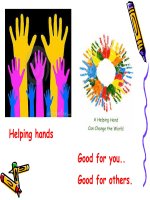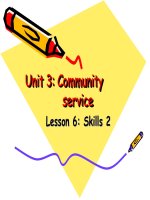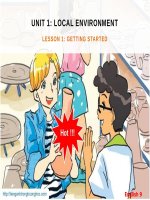English 9 unit 1 local environment lesson 6 skills 2
Bạn đang xem bản rút gọn của tài liệu. Xem và tải ngay bản đầy đủ của tài liệu tại đây (954 KB, 13 trang )
UNIT 1: LOCAL ENVIRONMENT
LESSON 6: SKILLS 2
1
Revision
Can you tell me and classmates your plan for
this day out. Make notes in the table.
A DAY OUT
Place
Means of transport
Details
Who to prepare
Time to set off
Food
Drinks
Activities
Time to come back
2
the benefits of traditional crafts (B) or challenges that
artisans may face (C). Write B or C.
B
C
1. providing employment
2.losing authenticity
3. providing additional income
5.treating waste and pollution
4.relying too much on
tourism
6. preserving cultural heritage
Can you add some more benefits and challenges?
3
Can you add some more benefits and
challenges that artisans may face?
Other benefits:
-
Creating national/regional pride
helping develop tourism,
helping improve local infrastructure and services,
Creating cohesion between craft families and
communities
Other challenges:
- limited designs, - natural resources
running out,
- competition from other countries
4
Đi nhanh qua
cái gì
Quay đầu nhìn cái
gì, đi thăm xung
quanh
to
Through
Coi trừng
Cẩn
thận
Hi vọng
up ahead
back
Look
for
out
round
on
Đứng nhìn mà
không tham gia vào
Tiên liệu ,tính
toán trước việc
gì
in
Suy ngẫm
chuyện gì trong
quá khứ
Tìm kiếm cái
gì
forward to
Ghé thăm chỗ
nào
Mong gì điều
gì
5
6
I. Listening
4Teen radio is asking different students about their places
of interest.
Activity 1 Describe what you see in each picture. Do
you know what places they are?
A. Ha Noi Botanical Garden
B. Bat Trang pottery village
C. Viet Nam National Museum
of History
Listen and check your answers.
7
Activity 2 Listen to what these students say and decide if
the statements are true (T) or false (F).
T
1. Tra is interested in history.
2. Nam likes making things with his hands.
T
3. Nam’s family owns a workshop in Bat Trang.
F
4. The trees in the garden only come from provinces of Viet
Nam.
F
5. Hoa loves nature and quietness.
T
8
Activity 3 Listen again and complete the table. Use no
more than three words for each blank.
Student
Place of interest
Activities
Seeing various (1) _________
artefacts
Viet Nam National Looking round and (2)
Museum of History
_________
exploring Vietnamese culture
Tra
Bat Trang pottery
village
Nam
- Learning to (3) _________
and (4) _________
make things
on _________
ceramics
up (5)
Climbingpaint
the hill
Ha Noi Botanical Reading (6) _________
books
Feeding (7) _________
Garden
pigeons
people
(8) _________
Hoa
watching
9
II. Writing
Activity 4 If a visitor has a day to spend in your
hometown/city, where will you advise him/her to go?
What can they do there? Work in pairs, discuss and
take notes of your ideas.
Places
Activities
Place 1: _______________
_______________________
Place 2: _______________
_______________________
Place 3: _______________
_______________________
10
Activity 5: Imagine that your Australian pen friend is
coming to Viet Nam and will spend a day in your
hometown/city. He/She has asked for your advice on the
places of interest they should go to and the things they
can do there. Write an email to give him/her some
information.
From:
To:
Subject: Places of interest in my hometown/city
Dear
Look forward to seeing you soon!
Best wishes,
11
Dear Mira,
It’s great to know that you’re coming to Viet Nam. What a pity you
can only spend one day in Ha Noi. There are so many interesting
places in the city, but I think within one day you should be able to
visit three places. The rest place I suggest is Viet Nam National
Museum of History. You like history, so it’s a must-see place.
There’s an extensive collection of artefacts tracing Viet Nam’s
history. They’re arranged chronologically from primitive life to
modern times. The second place is Hoan Kiem Lake. It’s one of the
symbols of Ha Noi. There you can enjoy the beautiful scenery and
visit Ngoc Son Temple. You can also have a look at the Old
Quarter. Wander around the old streets and some ancient houses
to explore Vietnamese culture. Conveniently, these places are
close to one another, so we can walk around easily. Tell me when
you’re coming, so I can show you around these places.
Look forward to seeing you soon!
Best wishes,
Thuc Anh
12
III. Homework
• Learn vocabulary by heart.
• Redo exercises.
• Prepare the next lesson: Looking back - Project
13









